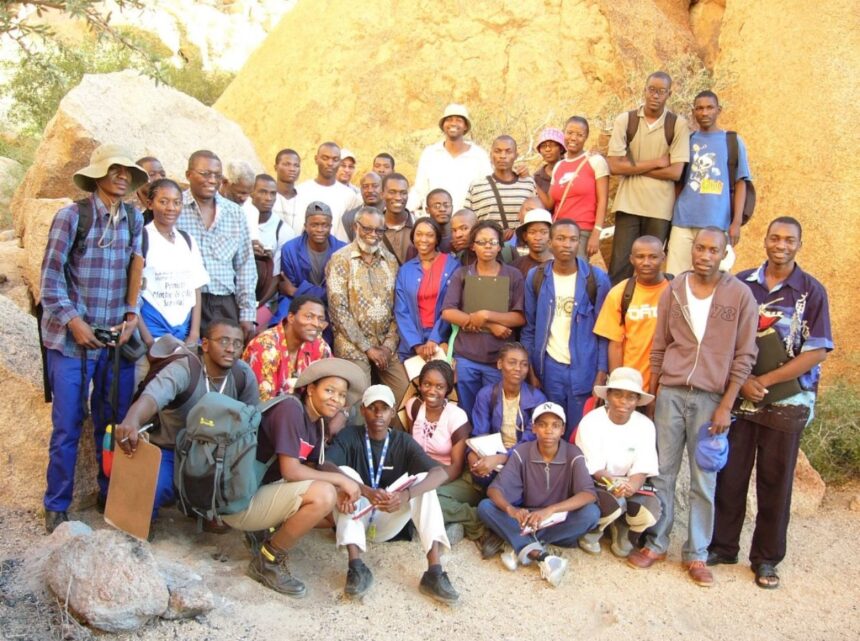Andreas Thomas
Namibia’s founding president Sam Nujoma may be gone, but his legacy endures in the hearts and minds of Namibians and people around the world.
The nonagenarian statesman died at the age of 95 in a hospital in Windhoek on Saturday, 8 February 2025.
Since his passing, people have continued to relate memories and personal experiences they shared with the late former president and leader of the Namibian revolution.
The extent of the reverence people have for Nujoma can be seen in the numerous condolence messages coming from locals and world leaders, including heads of state and governments.
Among those who had close contact with Nujoma were former University of Namibia (Unam) geology students. They had the honour of engaging him on many occasions, particularly when they were on field trips to geological sites across Namibia.
After completing his third and final term as Namibia’s head of state, Nujoma chose not to retreat into retirement, but instead to immerse himself in the study of geology.
In 2005, he applied and was admitted to study economic geology at the national university, and graduated with a Master of Science degree in April 2009. At the time, he was 80 years old.
Speaking to Nampa, the former geology students commended Nujoma’s humility and dedication to learning.
Elina Muzanima-Kaasheka was an undergraduate geology student when Nujoma began studying at Unam.
“I’m happy that I had the privilege of working with him, to attend field trips with him. During those field trips, we visited several geological areas like the Uis tin mine (in Erongo region),” she said.
“Most of the time, he asked insightful questions that an average student would not really think of asking, he was really smart. Another observation I picked up was that Nujoma was a very down-to-earth, caring and loving individual.”
She added that the founding president and wanted to be addressed as such.”
She also remembered sitting around the campfire when Nujoma would tell them stories “and answered all the questions we asked. So, he was really a loving and kind person. He made you feel free with him. We could even lean on him, and take all types of photos with him. He was so caring.”
Vilho Shafombambi, also a former geology student, said it was an exciting moment when they heard that the founding president would be studying with them for his master’s degree.
“He was very curious in terms of geology. He would ask a lot of questions about the structures of the rocks, and all those nitty-gritties that we are doing in the field. He was very humble with us,” said Shafombambi.
Esther Kakuka also had fond memories of the late president. She said Nujoma was always welcoming during the excursions.
“We were a large group, but he was very approachable. He was very welcoming, and would share jokes with anyone during our break times in the field.
“Then he would also ask a lot of questions, or he would answer our questions. And you know, we were young then, we wanted to take a lot of pictures. But he would stand there with his smile, not getting tired. Students would jump next to him, one by one, taking pictures as souvenirs,” said Kakuka.
She also recalled that Nujoma always insisted on camping with his fellow students during the field trips.
“His team would want to have a separate meal, but he said ‘No, no, no, I am a student.’ I have to share what my fellow students are eating. We felt very honoured and, you know, he was very humble and very passionate about geology, and that is what we took from him,” she said.
Kaura Kaura, the son of late former opposition leader, Katuutire Kaura, remembered Nujoma with particular fondness. He recounted during one field trip, when Nujoma’s bodyguards attempted to keep him away from Nujoma because he was Kaura’s son.
“When he sensed that the security personnel were trying to block off direct engagement with me, he said ‘No, let Kaura come.’ After that incident the rest of the excursion was great. It was just fun,” Kaura recalled.
Professor Ben Mapani was one of Nujoma’s lecturers. He said the university’s decision to enrol him at the postgraduate level was due to Nujoma’s experience in government, having signed countless agreements on geology, mining and the extractive industry.
“That’s why we decided that probably, he could just do a master’s, because he already had prior knowledge. He understood the value chain of geology from mineral exploration to feasibility study to development of a mine, actual mining, and processing,” he said.
Mapani said Nujoma actively participated in field trips with undergraduate geology students. Nujoma would spend up to five days with the pupils during the field trips, he said. The former president also took research excursions to Zambia and the Democratic Republic of Congo as part of his thesis, which Mapani co-supervised.
Nujoma’s primary interest was the contribution of copper to the development of Southern Africa, particularly in copper-producing countries such as Zambia, Namibia and the DRC.
“We were very excited, you don’t usually get such a person as a student. But as a student, he was very disciplined. I was very shocked, because we used to give him papers to read, and he would go and read them.”
– Nampa


